4.1. Service Locator
THIS IS CONSIDERED TO BE AN ANTI-PATTERN!
Service Locator is considered for some people an anti-pattern. It violates the Dependency Inversion principle. Service Locator hides class” dependencies instead of exposing them as you would do using the Dependency Injection. In case of changes of those dependencies you risk to break the functionality of classes which are using them, making your system difficult to maintain.
4.1.1. Propósito
Implementar una arquitectura débilmente acoplada con el fin de obtener un código más testeable, mantenible y ampliable. El patrón DI y el patrón Service Locator son una implementación del patrón Inverse of Control.
4.1.2. Uso
Con ``ServiceLocator”” puede registrar un servicio para una interfaz determinada. Al usar la interfaz, puede recuperar el servicio y usarlo en las clases de la aplicación sin conocer su implementación. Puede configurar e inyectar el objeto Service Locator en el arranque.
4.1.3. Diagrama UML

4.1.4. Código
Puedes encontrar el código en GitHub
Service.php
1<?php
2
3namespace DesignPatterns\More\ServiceLocator;
4
5interface Service
6{
7}
ServiceLocator.php
1<?php
2
3declare(strict_types=1);
4
5namespace DesignPatterns\More\ServiceLocator;
6
7use OutOfRangeException;
8use InvalidArgumentException;
9
10class ServiceLocator
11{
12 /**
13 * @var string[][]
14 */
15 private array $services = [];
16
17 /**
18 * @var Service[]
19 */
20 private array $instantiated = [];
21
22 public function addInstance(string $class, Service $service)
23 {
24 $this->instantiated[$class] = $service;
25 }
26
27 public function addClass(string $class, array $params)
28 {
29 $this->services[$class] = $params;
30 }
31
32 public function has(string $interface): bool
33 {
34 return isset($this->services[$interface]) || isset($this->instantiated[$interface]);
35 }
36
37 public function get(string $class): Service
38 {
39 if (isset($this->instantiated[$class])) {
40 return $this->instantiated[$class];
41 }
42
43 $object = new $class(...$this->services[$class]);
44
45 if (!$object instanceof Service) {
46 throw new InvalidArgumentException('Could not register service: is no instance of Service');
47 }
48
49 $this->instantiated[$class] = $object;
50
51 return $object;
52 }
53}
LogService.php
1<?php
2
3declare(strict_types=1);
4
5namespace DesignPatterns\More\ServiceLocator;
6
7class LogService implements Service
8{
9}
4.1.5. Test
Tests/ServiceLocatorTest.php
1<?php
2
3declare(strict_types=1);
4
5namespace DesignPatterns\More\ServiceLocator\Tests;
6
7use DesignPatterns\More\ServiceLocator\LogService;
8use DesignPatterns\More\ServiceLocator\ServiceLocator;
9use PHPUnit\Framework\TestCase;
10
11class ServiceLocatorTest extends TestCase
12{
13 private ServiceLocator $serviceLocator;
14
15 public function setUp(): void
16 {
17 $this->serviceLocator = new ServiceLocator();
18 }
19
20 public function testHasServices()
21 {
22 $this->serviceLocator->addInstance(LogService::class, new LogService());
23
24 $this->assertTrue($this->serviceLocator->has(LogService::class));
25 $this->assertFalse($this->serviceLocator->has(self::class));
26 }
27
28 public function testGetWillInstantiateLogServiceIfNoInstanceHasBeenCreatedYet()
29 {
30 $this->serviceLocator->addClass(LogService::class, []);
31 $logger = $this->serviceLocator->get(LogService::class);
32
33 $this->assertInstanceOf(LogService::class, $logger);
34 }
35}